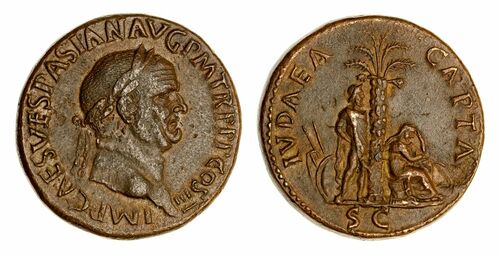
Auction: 24005 - The Official Coinex Auction of Ancient, British and World Coins
Lot: 117
Roman Empire, Vespasian (AD 69-79), AE Sestertius, 'Judaea Capta' type, IMP CAES VESPASIAN AVG P M TR P P P COS III, laureate head right, rev. IVDAEA CAPTA, palm tree, to the left, a captive standing right with his hands tied behind his back, to the right, Judaea seated right upon cuirass in attitude of mourning, a hexagonal and two oval shields with two spears to the left, a round shield to the right, SC in exergue, 25.62g (RIC 159; Cohen 234; Hendin 6530; BMCRE 533), remarkably well-preserved example with a fantastic portrait, highlighted with a rich red-brown tone, perfectly centred and about extremely fine, determined as 'No Decision' by NGC [NGC Submission No. 8221848-004]
Provenance
The Major Hamish and Mrs Ann Orr-Ewing Collection of Roman Coins
Vespasian's support from the eastern legions was bolstered by that of the Moesian troops who had been unable to reach Otho in time to assist in the defence against Vitellius's invasion earlier in the year. His attempts to avoid any further civil conflict were thwarted when the legions of the Danube, led by Antoinus Primus. Primus launched a breakaway invasion of Italy, ostensibly in the name of Vespasian, outmanoeuvring Vitellius's generals, and forcing the latter's forces into battle at the Second Battle of Bedriacum in October. The armies of northern Italy quickly defected to Primus, whose forces launched vicious raids and sackings of many of the settlements throughout their march. By the time news reached Vitellius of the defeat, violence had erupted in Rome, with Primus's troops on the approach.
Vitellius desperately offered his abdication to the Prefect of Rome, Vespasian's brother Flavius Sabinus. The latter accepted this surrender; however, the Praetorian Guard were apoplectic at the notion of surrendering the imperial title to yet another provincial general. The people of Rome, likewise, flew into a rage at Vitellius for his cowardice. The mob charged towards the Capitoline Hill, setting it, with the inferno claiming the sacred Temple of Jupiter. Both Vitellius and Sabinus were besieged, and while Vespasian's younger son Domitian escaped, Sabinus was captured and executed by the Praetorian Guard. Primus's troops entered the city on 20 December, capturing Vitellius and brutally torturing him before finally killing him in the forum, and, as with Galba, tossed his dead body into the Tiber. Primus launched a reign of terror, plundering the city and massacring the supporters of Vitellius, before Mucianus and his troops finally arrived to restore order.
When Vespasian finally arrived in Rome in October of 70, it had been 15 months since he had been hailed emperor by his troops, and over 9 months since he had been formally recognised by the senate. The empire had survived its most bloody and chaotic period since its inception: with the imperial treasury bankrupt, the legions decimated, the upper class ravaged through purges and counter-purges, and a major revolt emerging across Gaul and Germania under the leadership of Julius Civilis, the new emperor had a major undertaking on his hands. Part of ensuring stability involved the emphasis of dynastic continuity, and Vespasian made sure to involve both Titus and Domitian in public life, with the former running much of the day-to-day matters of government, and the latter joining the army against Civilis in Germania, with that rebellion being subdued in late 70.
In Titus, Vespasian had a potential heir by primogeniture, a novelty to the Romans, and part of establishing Titus's own legitimacy was through endless public reminders of his victory over the Judaean revolt. Following a year of near constant violence and bloodshed among the Romans themselves, the Judaea Capta series was a highly popular, propagandistic reminder that Vespasian and Titus had been busy doing what the Romans ought to have been doing: killing rebellious foreigners and destroying their temples. In addition to replenishing the imperial coffers with loot, Vespasian's re-asserted imperial authority abroad - annexing Commagene in 72 and authorising expeditions in Britannia later on, which resulted in the annexation of northern England, southern Scotland, and establishing imperial authority in Wales. This created a host of new provincial positions, which Vespasian shamelessly sold off to applicants he knew would attempt to embezzle funds - only to sell them pardons and therefore source extra revenue.
Although the Flavian dynasty ended in relative disgrace, it did re-establish peace and financial stability across the empire, and for the first time since the death of Caligula, a stable mechanism for the transition of power which would act as the example during the 'Pax Romana' of the Antonine-Nervan dynasty.
Subject to 20% VAT on Buyer’s Premium. For more information please view Terms and Conditions for Buyers.
Sold for
£2,700
Starting price
£1500




